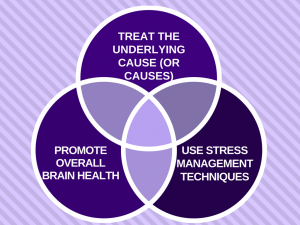
Hi, I’m Pamela Coburn-Litvak.
Welcome to my website! I’m so glad you are here.
As a Ph.D.-trained neuroscientist, I’ve spent most of my career studying and teaching about stress and stress-induced disorders of the mind.
Stress is a direct contributor to not just one, but two of the most rampant mind-brain disorders in the world today: depression and anxiety. While it’s true that these can be serious – even life-threatening – illnesses, research has taught us a lot about how to manage them.
So my mission is simple: to share the most up-to-date, research-proven methods for recovering from these disorders.
You can learn more about me and my research background elsewhere. For now, let’s focus on what this website can do for YOU.
Who is this website for?
If you or someone you love is dealing with stress or stress-induced issues like depression or anxiety, then this website is designed just for you.
You might be interested in reading why I started this website.
What exactly is Major Depression?
Major Depressive Disorder (MDD), also known as unipolar depression, is a debilitating mental state characterized by persistent feelings of sadness and lack of interest in the outside world. Those with this type of depression often feel trapped in a lonely, internal world devoid of happiness or hope.
The term “unipolar” means that depressive feelings only trend in one direction: down into the “lows.” This differentiates major depression from “bipolar” disorder, which oscillates between extreme lows and highs (i.e. mania).
You can also read my blog post on the clinical symptoms of depression as well as the heavy costs of depression to our finances, relationships, and health.
What exactly is an Anxiety Disorder?
Anxiety is the feeling of unease, nervousness, or worry we sometimes feel about a future event. It is the fear that something dangerous or terrible is about to happen. An anxiety disorder occurs when our fear about the future escalates to the point where it interferes with normal functioning.
Examples of anxiety disorders include panic disorder, general anxiety disorder, phobias, obsessive-compulsive disorders, and post-traumatic stress disorder.
How are depression and anxiety usually treated?
Knowledge is power.
That’s why it’s important to understand the scientifically proven ways of combatting stress-induced anxiety and/or depression.
All guidance on this website basically falls into one or more of the following three categories of treatment:

It’s important to treat the root cause (or causes) of any mind-brain disorder. This is because the root cause(s) eventually result in neurochemical and neurostructural imbalances within the brain. Such chemical/structural imbalances, in turn, create imbalances in communication between brain areas that modulate our thoughts and emotions. And it is these imbalanced thoughts and emotions that underlie all major symptoms of depression and anxiety.
Underlying causes of depression and anxiety are often treated with psychotherapy (with cognitive behavioral therapy being the most popular, evidence-based choice) and medication.
Natural alternatives, including exercise, good nutrition, and light therapy, will often help correct brain imbalances while also promoting brain health.
Stress management is often neglected when it comes to treating depression and anxiety. However, stress management techniques can be powerful tools in combatting and even preventing stress-induced disorders.
Learning to manage our stress properly on the front end can prevent much of the emotional fallout we experience on the back-end, such as feelings of depression and anxiety.
How will this website benefit you?
This website is dedicated to sharing information that promotes brain health. A healthier brain will help all of us:
- overcome the major and minor stressors in our lives;
- interpret life events in a positive, meaningful way;
- make wiser decisions (e.g. better lifestyle choices and more productive relationship choices);
- connect with others on a deeper level;
- avoid counterproductive feelings of worry, fear, despair, and hopelessness; but instead
- instill feelings of confidence, calmness, happiness, and hope.
We also know that there is a strong brain-body connection.
Because the brain and the rest of the body are so intimately connected, boosting our brain health is the best way to boost our overall health. Simply put, a healthier brain = healthier YOU.
